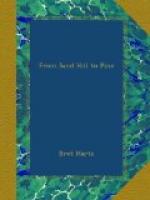He half regretted this speech the next moment in the quick flush—the male instinct of rivalry—that brought back the glitter of Richards’s eyes. “I reckon I kin take care of that, sir,” he said slowly, “and I kalkilate that the next time I meet that chap—whoever he may be—he won’t see so much of my back as he did.”
The editor knew there was little doubt of this, and for an instant believed it his duty to put the matter in the hands of the police. Richards was too good and brave a man to be risked in a bar-room fight. But reflecting that this might precipitate the scandal he wished to avoid, he concluded to make some personal investigation. A stronger curiosity than he had felt before was possessing him. It was singular, too, that Richards’s description of the girl was that of a different and superior type—the hidalgo, or fair-skinned Spanish settler. If this was true, what was she doing there—and what were her relations to the Ramierez?
PART II
The next afternoon he went to the fonda. Situated on the outskirts of the town which had long outgrown it, it still bore traces of its former importance as a hacienda, or smaller farm, of one of the old Spanish landholders. The patio, or central courtyard, still existed as a stable-yard for carts, and even one or two horses were tethered to the railings of the inner corridor, which now served as an open veranda to the fonda or inn. The opposite wing was utilized as a tienda, or general shop,—a magazine for such goods as were used by the Mexican inhabitants,—and belonged also to Ramierez.
Ramierez himself—round-whiskered and Sancho Panza-like in build—welcomed the editor with fat, perfunctory urbanity. The fonda and all it contained was at his disposicion.
The senora coquettishly bewailed, in rising and falling inflections, his long absence, his infidelity and general perfidiousness. Truly he was growing great in writing of the affairs of his nation—he could no longer see his humble friends! Yet not long ago—truly that very week—there was the head impresor of Don Pancho’s imprenta himself who had been there!
A great man, of a certainty, and they must take what they could get! They were only poor innkeepers; when the governor came not they must welcome the alcalde. To which the editor—otherwise Don Pancho—replied with equal effusion. He had indeed recommended the fonda to his impresor, who was but a courier before him. But what was this? The impresor had been ravished at the sight of a beautiful girl—a mere muchacha—yet of a beauty that deprived the senses—this angel—clearly the daughter of his friend! Here was the old miracle of the orange in full fruition and the lovely fragrant blossom all on the same tree—at the fonda. And this had been kept from him!




